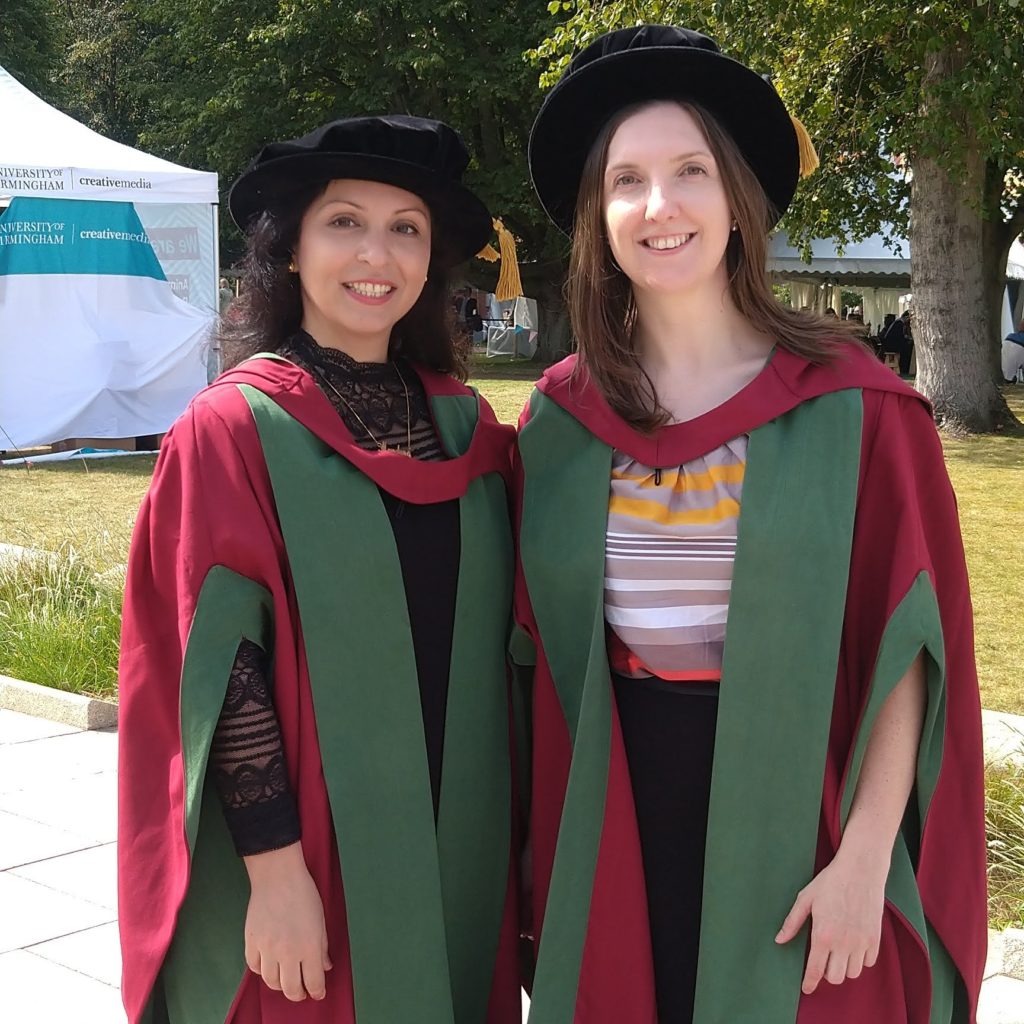Welcome Message

A warm welcome to our first online edition of HEUnews.
In this edition, we introduce four (of many) new members of the HEU Team: Ayesha Iqbal, Rebecca Johnson, Camille Allard and Melanie Dillon. We highlight research on the management of missed miscarriage, which has been published as a news article by NIHR. And we shine the research spotlight on our postgraduate research students, specifically on two of our third year students: Lena Schnitzler and Sonja Bloch. Sonja and Lena are both undertaking research related to sexual health.
And, speaking of postgraduate research, we were excited last week to see our beautiful campus buzzing with graduation events, and we were particularly proud to see three of our former PhD students attending. Pictured above is Dr Katie Breheny, and pictured below are Dr Mandana Zanganeh (left) and Dr Hannah Bromley (right).

What’s New In HEU?
We welcome new members of HEU staff…
We’ve been expanding over the last few months, but not because of too much snacking whilst working from home! In this edition of HEUnews we extend a warm HEU welcome to Ayesha Iqbal, Melanie Dillon, Camille Allard and Rebecca Johnson.

Welcome to Ayesha Iqbal…
Ayesha joined the Health Economics Unit in April 2021 as a Research Associate, after completing her MSc in Health Economics and Econometrics here at the University of Birmingham. Ayesha is currently working with HEU’s Tracy Roberts and Philip Kinghorn on a three year NIHR funded project, led by Professor Jon Glasby from the Department of Social Work and Social Care. The project aims to explore what happens to older people and care staff when homes close, how best to manage closures in a way that minimises negative outcomes for older people and families, and key lessons for Councils as they manage future closures.
Melanie Dillon, Camille Allard and Rebecca Johnson all join HEU to work on the Wellcome Trust funded WISE project, led by HEU’s Hareth Al-Janabi. This 4-year project involves detailed investigation of how schools and workplaces invest in mental wellbeing to understand how such processes can be best supported by evidence and policy.

Welcome to Melanie Dillon…
Melanie is the Research Administrator for the WISE project, with a background in the NHS and libraries. She will be working across the four project workstreams to support research activity and the wider team.

Welcome to Camille Allard…
Camille Allard is a Research Fellow, with a background in sociology and philosophy, and organisational studies. Her role in the WISE study is to lead Work Package 4, looking at what evidence is used by schools and workplaces investing in mental wellbeing, how these organisations react to other forms of evidence, and what their evidence needs are.

Welcome to Rebecca Johnson…
Rebecca Johnson is a Research Fellow, with a background in public health and health services research, with a particular interest in mixed methods projects. Her role in the WISE Study is to lead Work Package 2, using process tracing to understand decision making processes around how schools allocate resources for mental health and wellbeing.
Have you Heard?
About interest in study findings on management of missed miscarriage
In May, HEU’s Chidubem (Duby) Ogwulu, Tracy Roberts and Eleanor Williams had their cost-effectiveness analysis based on the MifeMiso trial published in The British Journal of Obstetrics and Gynaecology (BJOG): it showed that a combination of mifepristone plus misoprostol is more cost-effective than misoprostol alone, the current standard NHS treatment, for the medical management of missed miscarriage. A news article on the exciting research was published by the NIHR on their website and shared on their social media pages. Tracy was also interviewed by Free Radio Birmingham regarding the trial, analysis, and results!
Duby and Eleanor are past and present HEU PhD students (respectively) and have enjoyed working together on a number of projects relating to women’s and sexual health. Duby completed her PhD which focused on developing and piloting approaches for outcome valuation related to sexually transmitted infections, in particular chlamydia, in 2018. Eleanor is currently doing a PhD on the transferability of model-based economic evaluations of postpartum haemorrhage management across low-income settings.
Spotlight on Postgraduate Research

Sonja Bloch
Sonja started her PhD in 2018. Her PhD explores approaches for measuring the costs and outcomes of control programmes for sexually transmitted infections (STIs), with the aim of generating meaningful evidence for local decision-makers in the UK. The research is supervised by HEU’s Louise Jackson and Emma Frew as well as Professor Jonathan Ross from University Hospitals Birmingham NHS Foundation Trust (UHB). Funding for the PhD is from Umbrella Sexual Health Services, UHB.
The PhD began with a systematic review of economic evaluations for control programmes of STIs. Findings from the systematic review have been published in Sexually Transmitted Infections and indicate that there’s a heterogeneity in methods employed for current economic evaluations in this area. Main types of economic evaluations utilised were cost-effectiveness and cost-utility-analysis. Based on previous research, economic evaluation evidence is rarely considered by public health decision-makers. This project aimed to find out how local decisions, in relation to sexual health services (SHS), are made and what kind of evidence is considered. Qualitative interviews with local, regional and national decision-makers were conducted to explore their perspectives on economic evidence in the context of SHS, as well as interviews with academics to understand approaches for economic evaluations of public health programmes.
Interviews with academics resulted in discussions around new methodologies to include broader costs and outcomes and challenges associated with developing useful evidence for local decision-makers. The decision-makers interviews showed that there is a focus on budgets, costs, and local differences when considering evidence. Findings were presented at this year’s iHEA Congress and at STI/HIV conferences. The last phase of the PhD involves the development of a patient care pathway for online screening kits of STIs during COVID-19 along with a disaggregated cost-analysis.

Lena Schnitzler
Lena is a current PhD candidate jointly affiliated with HEU – where she is supervised by Louise Jackson and Tracy Roberts – and Maastricht University. As part of her doctoral research, Lena explores the wider societal costs and benefits (those falling on other sectors outside health) of sexual health interventions. Lena conducted a critical appraisal of cost-of-illness studies and economic evaluations in sexual health, to explore what different types of societal costs and benefits are considered in those studies. Her systematic review of cost-of-illness studies of sexually transmitted infections has recently been accepted for publication in BMC Health Services Research. The review reveals that societal costs still remain largely excluded from cost-of-illness studies, even when it is evident that costs beyond health (i.e. labour/productivity costs) substantially contribute to the total economic burden. Her second systematic review of economic evaluations is underway; preliminary findings show that where a societal perspective is adopted this is often limited in scope (i.e. limited to health and productivity costs).
Lena also conducted expert interviews with clinicians, academics, scientists, programme managers and consultants working in sexual health to further explore wider societal costs and benefits associated with sexual health interventions that tend to be excluded from economic analyses. Findings from the interviews reveal that sexual health is strongly linked to other sectors outside health, including, education, labour, and criminal justice. Lena’s work will help improve understanding of the wider societal implications of sexual health issues and inform future, more comprehensive economic evaluations.
In March 2021, Lena published an editorial in the International Journal of Technology Assessment in Health Care that summarises and discusses ‘The broader societal impacts of COVID-19 and the growing importance of capturing these in health economic analyses’.
Selected Recent Publications
Achana F, Gallacher D, Oppong R, Kim S et al. Multivariate Generalised Linear Mixed-Effects Models for Analysis of Clinical Trial-Based Cost-effectiveness Data. Medical Decision Making, 2021. DOI: 10.1177/0272989X211003880
Al-Janabi H, Efstathiou N, McLoughlin C, Calvert M, Oyebode J. The scope of carer effects and their inclusion in decision-making: a UK-based Delphi study. BMC Health Services Research, 2021. DOI: 10.1186/s12913-021-06742-4
Bloch SCM, Jackson LJ, Frew E, Ross JDC. Assessing the costs and outcomes of control programmes for sexually transmitted infections: a systematic review of economic evaluations. Sexually Transmitted Infections, 2021. DOI: 10.1136/sextrans-2020-054873
Hall J, Goranitis I, Kigozi J, Guariglia A. New evidence on the impact of the Great Recession on health-compromising behaviours. Economics & Human Biology, 2021. DOI: 10.1016/j.ehb.2021.100980
Oppong R, Jowett S, Lewis M et al. The cost-effectiveness of different approaches to exercise and corticosteroid injection for Subacromial pain (impingement) syndrome. Rheumatology, 2021. DOI: 10.1093/rheumatology/keaa903
Schnitzler L, Janssen L, Evers S, Jackson L, Paulus A, Roberts T, Pokhilenko I. The broader societal impacts of COVID-19 and the growing importance of capturing these in health economic analyses. International Journal of Technology Assessment in Health Care, 2021. DOI: 10.1017/S0266462321000155
Guariglia A, Monahan M, Pickering K, Roberts T. Financial health and obesity, Social Science & Medicine, 2021. DOI: 10.1016/j.socscimed.2020.113665
